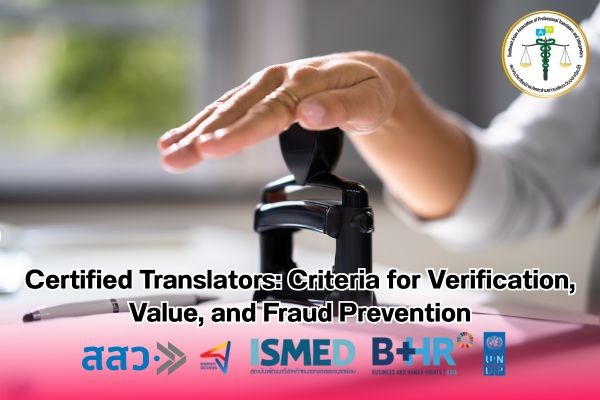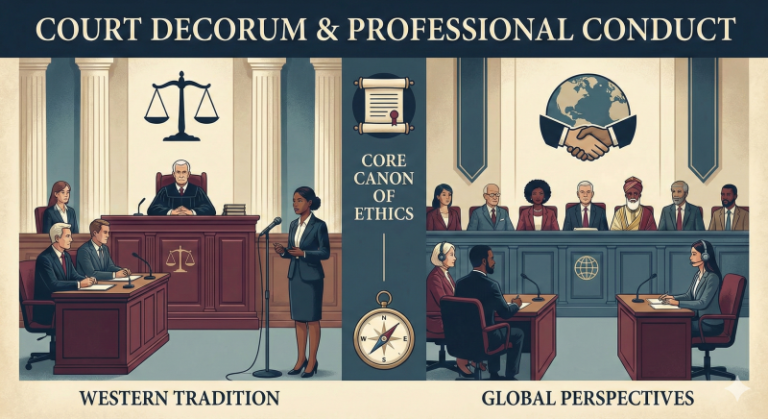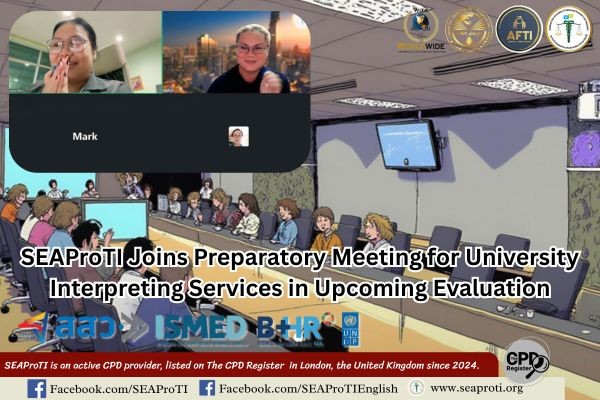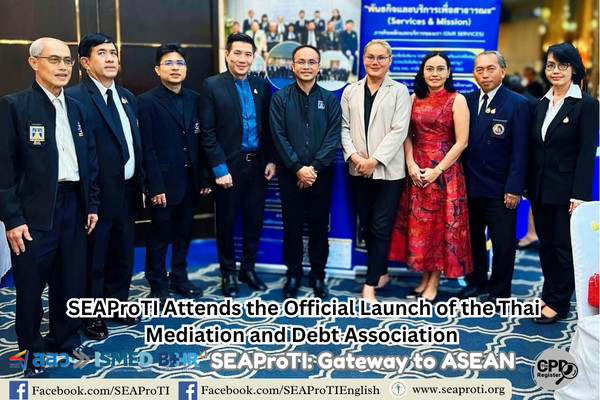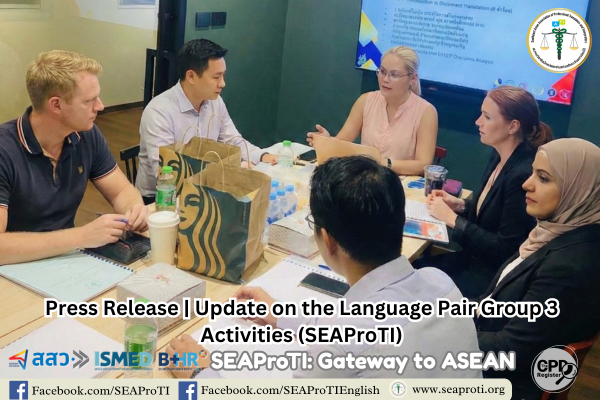Certified Translators: Criteria for Verification, Value, and Fraud Prevention
September 6, 2025, Bangkok – In today’s globalized world, translation of foreign-language documents plays a vital role in determining the rights, obligations, and legal standing of individuals and organizations. Accurate and certified translations can directly confirm legal rights or prevent harm, for example, in filing petitions with government agencies, presenting evidence in court, or executing international business contracts. Certified Translators thus serve as a key mechanism for building trust and safeguarding users of translation services.
A pressing problem in the current landscape is fraud by individuals who claim to be translators but lack professional qualifications, ethical standards, or adequate skills. Some rely on automatic translation tools, resulting in errors that can have direct consequences for litigants or individuals involved in administrative processes. This article sets out the criteria for verifying certified translators, the value of professional certification, and measures for preventing fraud in translation services.
Criteria for Verifying Certified Translators
Verifying whether a translator is a “Certified Translator” requires clear, verifiable evidence, not mere assertions. The principal criteria are:
- Professional Qualifications and License
Translators must hold relevant academic qualifications in translation or linguistics and possess a professional license issued by a recognized professional organization or an authorized body under law.
- Professional Translator ID Card
This card must state the translator’s name, membership number, and professional status, enabling verification of their credentials.
- Accreditation Certificate
A certificate or letter of accreditation must be issued by a professional association or institute overseeing quality standards.
- Official Seal of Approval
The seal, issued by a recognized third-party association or accreditation body, serves as final proof that the translation can be legally used before government agencies or courts.
Risks of Using Uncertified Translators
Engaging translators who lack professional certification can result in significant harm, including:
- Poor Quality: Reliance on machine translation without proper contextual understanding often leads to errors.
- Legal Risks: Uncertified documents may be rejected by courts or government authorities.
- Fraud: Some unqualified translators accept payment but fail to deliver work or provide unusable translations.
- Lack of Ethics: Translators outside of a professional framework are often not bound by codes of conduct, undermining trust.
Preventive Measures and Best Practices
Clients are advised to carefully verify a translator’s credentials before hiring. Essential steps include:
- Requesting the translator’s professional license.
- Checking their professional ID card.
- Obtaining a copy of their accreditation certificate.
- Confirming the official seal of approval on documents.
If a translator cannot provide these documents, clients should decline services to avoid legal and financial risks.
Conclusion
Certified Translators are not merely individuals with language skills but professionals bound by recognized standards of practice and ethics at both national and international levels. Verifying a translator’s qualifications is therefore crucial to minimizing legal risks and preventing fraud. Choosing translators who hold licenses, accreditation, and official seals of approval ensures that translated documents are accurate, credible, and legally reliable.
References
- Austermühl, F. (2014). Electronic tools for translators. Routledge.
- Byrne, J. (2012). Scientific and technical translation explained: A nuts and bolts guide for translators. Routledge.
- Hale, S. (2007). Community interpreting. Palgrave Macmillan.
- Katschinka, L. (2016). Certification of translators and interpreters. In F. Pöchhacker (Ed.), The Routledge Handbook of Interpreting (pp. 485–501). Routledge.
- Pym, A. (2010). Exploring translation theories. Routledge.
- Wadensjö, C. (1998). Interpreting as interaction. Routledge.
About Certified Translators, Translation Certification Providers, and Certified Interpreters of SEAProTI
The Southeast Asian Association of Professional Translators and Interpreters (SEAProTI) has published the criteria and qualifications for those registered as Certified Translators, Translation Certification Providers, and Certified Interpreters in Sections 9 and 10 of the Royal Gazette, Office of the Cabinet Secretariat, Office of the Prime Minister of Thailand, dated July 25, 2024, Volume 141, Part 66 Ngor, page 100. (Full text available: Certified Translators, Translation Certification Providers, and Certified Interpreters.).
The Council of State of Thailand has proposed a draft Royal Decree allowing registered translators, as well as translation certification providers from professional associations or accredited language training institutes, to legally certify translations (Letter to SEAProTI dated April 28, 2025).
SEAProTI is the first professional association in Thailand and Southeast Asia to implement a system for certifying Certified Translators, Translation Certification Providers, and Certified Interpreters.
Head Office: Baan Ratchakru Building, No. 33, Room 402, Soi Phaholyothin 5, Phaholyothin Road, Phaya Thai Sub-district, Phaya Thai District, Bangkok 10400, Thailand
Email: hello@seaproti.com
Tel.: (+66) 2-114-3128 (Office hours: Monday–Friday, 09:00–17:00)
นักแปลรับรอง (Certified Translators): เกณฑ์การตรวจสอบ คุณค่า และการป้องกันการฉ้อโกง
6 กันยายน 2568, กรุงเทพมหานคร – ในโลกยุคโลกาภิวัตน์ การแปลเอกสารจากภาษาต่างประเทศมีบทบาทสำคัญต่อสิทธิ หน้าที่ และสถานะทางกฎหมายของบุคคลและองค์กร เอกสารแปลที่ถูกต้องและได้รับการรับรองสามารถใช้ยืนยันสิทธิหรือป้องกันความเสียหายได้โดยตรง เช่น การยื่นคำร้องต่อหน่วยงานรัฐ การฟ้องร้องในศาล หรือการทำสัญญาทางธุรกิจระหว่างประเทศ นักแปลรับรอง (Certified Translators) จึงถือเป็นกลไกสำคัญที่สร้างความเชื่อมั่นและคุ้มครองผู้ใช้บริการ
ปัญหาที่พบในปัจจุบันคือการหลอกลวงโดยผู้ที่อ้างตนว่าเป็นนักแปล แต่กลับไม่มีคุณสมบัติวิชาชีพ ขาดจรรยาบรรณ หรือใช้เครื่องมืออัตโนมัติในการแปล ทำให้เกิดความผิดพลาดที่ส่งผลกระทบโดยตรงต่อคู่ความในคดี หรือผู้ที่ต้องใช้เอกสารในกระบวนการราชการ ดังนั้น บทความนี้มุ่งอธิบายเกณฑ์การตรวจสอบคุณสมบัติของนักแปลรับรอง คุณค่าของการใช้บริการนักแปลที่มีการรับรอง และแนวทางการป้องกันการฉ้อโกง
เกณฑ์การตรวจสอบคุณสมบัติของนักแปลรับรอง
การตรวจสอบว่าผู้แปลเป็น “นักแปลรับรอง” จำเป็นต้องพิจารณาหลักฐานที่พิสูจน์ได้อย่างชัดเจน มิใช่เพียงคำกล่าวอ้าง โดยมีเกณฑ์หลักดังนี้
- คุณวุฒิและใบอนุญาตวิชาชีพ (Professional License)
ผู้แปลต้องมีคุณวุฒิด้านการแปลหรือภาษาศาสตร์ และถือใบอนุญาตประกอบวิชาชีพที่ออกโดยองค์กรวิชาชีพหรือหน่วยงานที่มีอำนาจตามกฎหมาย
- บัตรวิชาชีพนักแปล (Professional Translator ID Card)
บัตรนี้ต้องระบุชื่อผู้แปล หมายเลขสมาชิก และสถานะการเป็นสมาชิกในองค์กรวิชาชีพ เพื่อให้สามารถตรวจสอบย้อนกลับได้
- หนังสือรับรองจากหน่วยงานรับรอง (Accreditation Certificate)
ต้องมีหนังสือหรือเอกสารรับรองจากสมาคมหรือสถาบันวิชาชีพที่เป็นผู้กำกับมาตรฐาน
- ตราประทับจากองค์กรที่สาม (Official Seal of Approval)
ตราประทับถือเป็นเครื่องหมายสุดท้ายที่ยืนยันว่างานแปลสามารถนำไปใช้กับหน่วยงานราชการหรือศาลได้อย่างถูกต้อง
ปัญหาที่เกิดจากการใช้นักแปลที่ไม่ได้รับการรับรอง
การเลือกใช้ผู้แปลที่ไม่มีคุณสมบัติรับรองอาจก่อให้เกิดความเสียหายหลายด้าน เช่น
- คุณภาพต่ำ: ผู้แปลบางรายใช้เครื่องมืออัตโนมัติ ทำให้ไม่เข้าใจบริบทและสาระสำคัญของข้อความ
- ความเสี่ยงทางกฎหมาย: เอกสารที่ไม่ได้รับรองมีโอกาสถูกปฏิเสธโดยหน่วยงานรัฐหรือศาล
- การฉ้อโกง: บางกรณีพบว่าผู้แปลรับเงินแล้วไม่ส่งงาน หรือส่งงานที่ไม่สามารถนำไปใช้ได้จริง
- ขาดจรรยาบรรณ: ผู้ที่ไม่อยู่ภายใต้มาตรฐานวิชาชีพมักไม่ผูกพันกับหลักจริยธรรม ส่งผลเสียต่อความเชื่อมั่นของผู้ใช้บริการ
การป้องกันและแนวทางที่ควรปฏิบัติ
ผู้ใช้บริการควรดำเนินการตรวจสอบอย่างรอบคอบก่อนว่าจ้าง โดยสามารถปฏิบัติดังนี้
- ขอให้นักแปลแสดง ใบอนุญาตวิชาชีพ
- ตรวจสอบ บัตรวิชาชีพนักแปล
- ขอสำเนา หนังสือรับรองจากสมาคม
- ยืนยัน ตราประทับนักแปลรับรอง บนเอกสาร
หากนักแปลไม่สามารถแสดงหลักฐานดังกล่าวได้ ควรปฏิเสธการใช้บริการเพื่อหลีกเลี่ยงความเสียหายทั้งทางกฎหมายและทางธุรกิจ
บทสรุป
นักแปลรับรอง (Certified Translators) ไม่ใช่เพียงผู้ที่มีทักษะด้านภาษา แต่คือผู้ที่ปฏิบัติงานภายใต้มาตรฐานวิชาชีพและจรรยาบรรณที่ได้รับการยอมรับในระดับชาติและสากล การตรวจสอบคุณสมบัติของนักแปลจึงเป็นขั้นตอนสำคัญที่ช่วยป้องกันความเสี่ยงทางกฎหมายและหลีกเลี่ยงการฉ้อโกง การเลือกใช้บริการนักแปลที่ถือใบอนุญาต บัตรรับรอง และตราประทับจากองค์กรที่เชื่อถือได้ จะทำให้เอกสารมีทั้งความถูกต้อง ความน่าเชื่อถือ และความมั่นคงทางกฎหมาย
เอกสารอ้างอิง
- Austermühl, F. (2014). Electronic tools for translators. Routledge.
- Byrne, J. (2012). Scientific and technical translation explained: A nuts and bolts guide for translators. Routledge.
- Hale, S. (2007). Community interpreting. Palgrave Macmillan.
- Katschinka, L. (2016). Certification of translators and interpreters. In F. Pöchhacker (Ed.), The Routledge Handbook of Interpreting (pp. 485–501). Routledge.
- Pym, A. (2010). Exploring translation theories. Routledge.
- Wadensjö, C. (1998). Interpreting as interaction. Routledge.
เกี่ยวกับนักแปลรับรอง ผู้รับรองการแปล และล่ามรับรองของสมาคมวิชาชีพนักแปลและล่ามแห่งเอเชียตะวันออกเฉียงใต้
* สมาคมวิชาชีพนักแปลและล่ามแห่งเอเชียตะวันออกเฉียงใต้ (SEAProTI) ได้ประกาศหลักเกณฑ์และคุณสมบัติผู้ที่ขึ้นทะเบียนเป็น “นักแปลรับรอง (Certified Translators) และผู้รับรองการแปล (Translation Certification Providers) และล่ามรับรอง (Certified Interpreters)” ของสมาคม หมวดที่ 9 และหมวดที่ 10 ในราชกิจจานุเบกษา ของสำนักเลขาธิการคณะรัฐมนตรี ในสำนักนายกรัฐมนตรี แห่งราชอาณาจักรไทย ลงวันที่ 25 ก.ค. 2567 เล่มที่ 141 ตอนที่ 66 ง หน้า 100 อ่านฉบับเต็มได้ที่: นักแปลรับรอง ผู้รับรองการแปล และล่ามรับรอง
** สำนักคณะกรรมการกฤษฎีกาเสนอให้ตราเป็นพระราชกฤษฎีกา โดยกำหนดให้นักแปลที่ขึ้นทะเบียน รวมถึงผู้รับรองการแปลจากสมาคมวิชาชีพหรือสถาบันสอนภาษาที่มีการอบรมและขึ้นทะเบียน สามารถรับรองคำแปลได้ (จดหมายถึงสมาคม SEAProTI ลงวันที่ 28 เม.ย. 2568)
*** สมาคมวิชาชีพนักแปลและล่ามแห่งเอเชียตะวันออกเฉียงใต้ เป็นสมาคมวิชาชีพแห่งแรกในประเทศไทยและภูมิภาคเอเชียตะวันออกเฉียงใต้ที่มีระบบรับรองนักแปลรับรอง ผู้รับรองการแปล และล่ามรับรอง
สำนักงานใหญ่: อาคารบ้านราชครู เลขที่ 33 ห้อง 402 ซอยพหลโยธิน 5 ถนนพหลโยธิน แขวงพญาไท เขตพญาไท กรุงเทพมหานคร 10400 ประเทศไทย
อีเมล: hello@seaproti.com โทรศัพท์: (+66) 2-114-3128 (เวลาทำการ: วันจันทร์–วันศุกร์ เวลา 09.00–17.00 น.)


